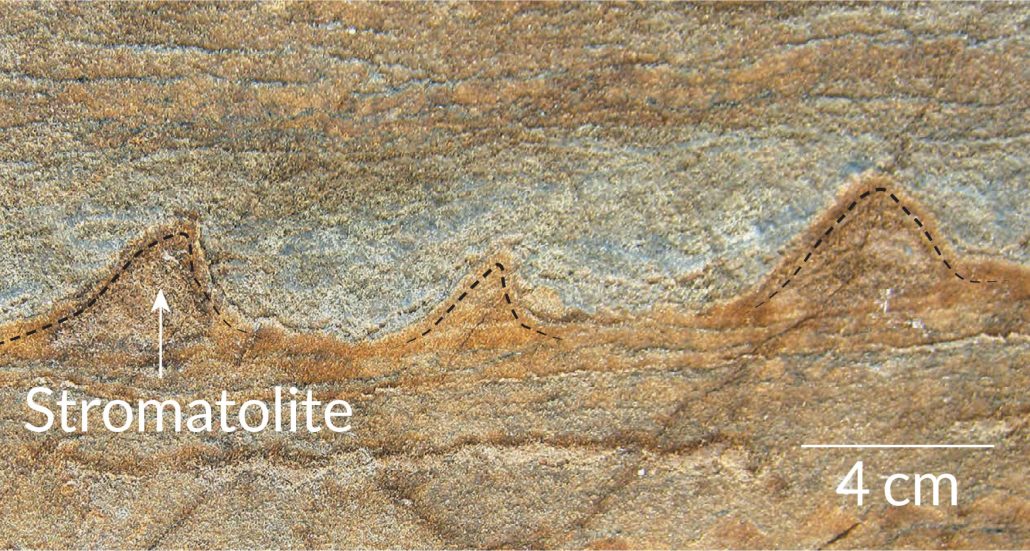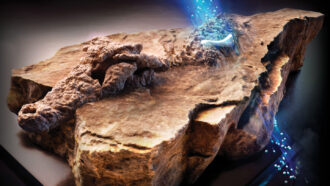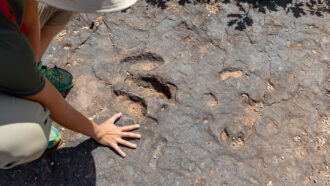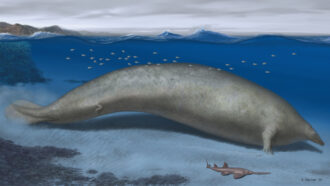(for more about Power Words, click here)
chemical A substance formed from two or more atoms that unite (become bonded together) in a fixed proportion and structure. For example, water is a chemical made of two hydrogen atoms bonded to one oxygen atom. Its chemical symbol is H2O. Chemical can also be an adjective that describes properties of materials that are the result of various reactions between different compounds.
fossil Any preserved remains or traces of ancient life. There are many different types of fossils: The bones and other body parts of dinosaurs are called “body fossils.” Things like footprints are called “trace fossils.” Even specimens of dinosaur poop are fossils. The process of forming fossils is called fossilization.
genetic Having to do with chromosomes, DNA and the genes contained within DNA. The field of science dealing with these biological instructions is known as genetics. People who work in this field are geneticists.
Greenland The world’s largest island, Greenland sits between the Arctic Ocean and North Atlantic. Although it is technically apart of North America, just east of Northern Canada, Greenland has been politically more linked to Europe. Indeed, Vikings arrived in Greenland around the 10 th century, and for a time the island was a colony of Denmark. In June 2009, Greenland became an independent nation. Ice covers roughly 80 percent of Greenland. Indeed, the Greenland ice sheet is the world’s largest. If its frozen water were to melt, it could raise sea levels around the world by 6 meters (about 20 feet). Although this is the 12 th biggest nation (based on surface area), it averages the fewest people per square kilometer of its surface area.
Mars The fourth planet from the sun, just one planet out from Earth. Like Earth, it has seasons and moisture. But its diameter is only about half as big as Earth’s.
microbe Short for microorganism . A living thing that is too small to see with the unaided eye, including bacteria, some fungi and many other organisms such as amoebas. Most consist of a single cell.
mineral The crystal-forming substances, such as quartz, apatite, or various carbonates, that make up rock. Most rocks contain several different minerals mish-mashed together. A mineral usually is solid and stable at room temperatures and has a specific formula, or recipe (with atoms occurring in certain proportions) and a specific crystalline structure (meaning that its atoms are organized in certain regular three-dimensional patterns). (in physiology) The same chemicals that are needed by the body to make and feed tissues to maintain health.
NASA Short for the National Aeronautics and Space Administration. Created in 1958, this U.S. agency has become a leader in space research and in stimulating public interest in space exploration. It was through NASA that the United States sent people into orbit and ultimately to the moon. It has also sent research craft to study planets and other celestial objects in our solar system.
organism Any living thing, from elephants and plants to bacteria and other types of single-celled life.
planet A celestial object that orbits a star, is big enough for gravity to have squashed it into a roundish ball and it must have cleared other objects out of the way in its orbital neighborhood. To accomplish the third feat, it must be big enough to pull neighboring objects into the planet itself or to sling-shot them around the planet and off into outer space. Astronomers of the International Astronomical Union (IAU) created this three-part scientific definition of a planet in August 2006 to determine Pluto’s status. Based on that definition, IAU ruled that Pluto did not qualify. The solar system now includes eight planets: Mercury, Venus, Earth, Mars, Jupiter, Saturn, Uranus and Neptune.
sea An ocean (or region that is part of an ocean). Unlike lakes and streams, seawater — or ocean water — is salty.
stromatolite A type of layered rock that forms when cyanobacteria in water create huge communities. Their sticky surfaces trap sediments floating in the water. That accumulating sediment reacts to calcium carbonate in the water. This creates limestone, which builds up very, very slowly. A century-old stromatolite may grow a mere 5 centimeters (2 inches) in size.








